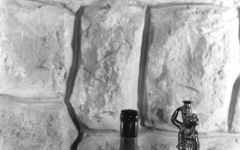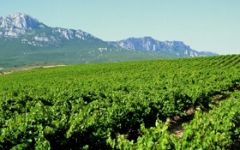Faustino V Rosado 1999


Product Details
Your Rating
Somm Note
Winemaker Notes
Bouquet: Fresh fruit.
Taste: Delicate and aromatic.
Grape Varieties: 100% Tempranillo.
Alcohol: 11%
Other Vintages
2007-
Wine &
Spirits









In the mid 1800s, Eleuterio Martinez Arzok took his first steps toward establishing himself as a producer and merchant of wines from the Rioja region of Spain. He started out by selling his wines in the Rioja and Basque regions, direct from the barrel. Much has changed since then and the winery he founded has since become known as one of the premier fine wine producers of the Rioja region.
In the late 1950s, his similarly adventurous descendant, Julio Faustino Martinez, launched the family-owned label in both national and international markets. Today, Bodegas Faustino is Rioja's largest exporter of Gran Reserva wines. The winner of numerous awards and gold medals in international competitions and tastings, Bodegas Faustino is a proud custodian of the Rioja region's growing international reputation as a source of truly world-class fine wines.
With 1600 acres of its own vineyards, Faustino is self-sufficient in producing its Reserva and Gran Reserva wines. The vineyards are located in the upper part of Rioja Alavesa at an altitude of between 1500 and 1800 feet. The climate is cool, influenced by the Atlantic Ocean, and the vines thrive in the chalky soil. The state-of-the-art Faustino winery has a stock of 45,000 barriques, 80% of which are American oak. The winery maintains a permanent stock of 9 million bottles of Reserva and Gran Reserva wines.

Whether it’s playful and fun or savory and serious, most rosé today is not your grandmother’s White Zinfandel, though that category remains strong. Pink wine has recently become quite trendy, and this time around it’s commonly quite dry. Since the pigment in red wines comes from keeping fermenting juice in contact with the grape skins for an extended period, it follows that a pink wine can be made using just a brief period of skin contact—usually just a couple of days. The resulting color depends on grape variety and winemaking style, ranging from pale salmon to deep magenta.

Highly regarded for distinctive and age-worthy red wines, Rioja is Spain’s most celebrated wine region. Made up of three different sub-regions of varying elevation: Rioja Alta, Rioja Alavesa and Rioja Oriental. Wines are typically a blend of fruit from all three, although specific sub-region (zonas), village (municipios) and vineyard (viñedo singular) wines can now be labeled. Rioja Alta, at the highest elevation, is considered to be the source of the brightest, most elegant fruit, while grapes from the warmer and drier Rioja Oriental produce wines with deep color and higher alcohol, which can add great body and richness to a blend.
Fresh and fruity Rioja wines labeled, Joven, (meaning young) see minimal aging before release, but more serious Rioja wines undergo multiple years in oak. Crianza and Reserva styles are aged for one year in oak, and Gran Reserva at least two, but in practice this maturation period is often quite a bit longer—up to about fifteen years.
Tempranillo provides the backbone of Rioja red wines, adding complex notes of red and black fruit, leather, toast and tobacco, while Garnacha supplies body. In smaller percentages, Graciano and Mazuelo (Carignan) often serve as “seasoning” with additional flavors and aromas. These same varieties are responsible for flavorful dry rosés.
White wines, typically balancing freshness with complexity, are made mostly from crisp, fresh Viura. Some whites are blends of Viura with aromatic Malvasia, and then barrel fermented and aged to make a more ample, richer style of white.
